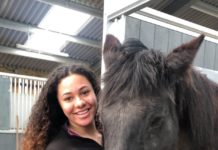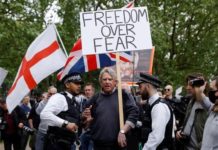The last year of the pandemic has been very tough. I was furloughed, made redundant and my University lectures went online only.
But the worst thing by far was finding out my mum had been diagnosed with cancer. Until you experience that moment, it’s very hard to picture.
And it’s been even more difficult to imagine how shocking and devastating the conversation with the doctor was for my mum.
Obviously, I’ve talked a lot with my mum about this – but I feel that sharing her experience may help anyone else in a similar situation – or who knows someone in that situation.
So here is my interview with my mum.
The day that you found out, what was that like for you?
“In that precise location and situation, it floors you. It knocks the breath out of you. You are stunned into silence.
You never expect that those words being spoken to you would ever be heard. Cancer is something that you’ve heard somebody else get, and you feel so sorry that they are going through something that appears life threateningly, terrifying, and despite statistics to the contrary, comes with the presumption that an early, painful and unavoidable death might follow.
So now imagine being given that diagnosis during a global pandemic. As someone who has struggled with mental health previously, my anxiety levels began to rise back to the surface.”
If we go back: the country is in lockdown and many struggled to get the kind of medical assistance previously take for granted. Government advice is to isolate yourself, socially distance, sanitise constantly and in order to protect the NHS, avoid places where you could inadvertently spread the Coronavirus, specifically hospitals and doctors’ surgeries. So, for someone who needed medical facilities, how did it work for you?
“On reflection, my timeline from feeling ‘unwell’ to diagnosis was not long in the general scheme of things and I can consider myself lucky that my Health Trust continued to operate in a reasonable capacity, so that cancer patients did not fall to the side lines. Where in so many parts of the country overwhelmed by the virus, appointments and operations were cancelled in their hundreds and sadly many people have died simply from lack of treatment and they have now been given a diagnosis which means their outlook, where once potentially treatable, now stands as bleak at best.”
So, back to January 2020 now. There are social media and press reports of something called Coronavirus and while the UK Government remains cautious, they appear not to be genuinely worried. Only 500 worldwide have caught the virus and with no known cases in the UK. Our Health Secretary says we are “well see prepared” to deal with any outbreak. For you then, what was going through your head in that January?
“I’m not worried, I’ve been searching for a new job and have secured an interview – life is generally good, I am in a good place and feel optimistic, so social media debates about face masks and the like go over my head.”
And you got that job, I think I remember?
“Yeah so I am successful at the interview and have been offered the job, so other than security and other checks which could take up to six weeks, I am confident the job is mine and try to relax – except I don’t feel well.”
Yeah, I remember that time now very clearly.
“I can’t put my finger on it, but I don’t feel right and have almost fainted on three occasions. I book a blood test with the nurse, an easy appointment to make and one blood test later, I am diagnosed as extremely anaemic and required to have two iron infusions and an endoscopy.”
And at the time we thought it wasn’t anything to worry about too much.
“Yeah try not to [worry] and attend the appointments as instructed. Sadly, the first person in the UK had died of the virus and whilst we are still going about our daily business of working, socialising, eating out, meeting friends, participating in sport, hugging and kissing our loved ones, it is becoming increasingly apparent that something is not right in the world.”
And then another month went by and you still had no update on starting your new job. Of course, people were starting to talk about a lockdown at this point. What were you thinking after believing you’d had a job secured, to now this?
“Still had no update on the job or any start date so I was thinking about that side of things. Would I have an income during this time or not? The results of my endoscopy show nothing of significance, but I don’t feel well and it’s beginning to worry me. On March 11th the World Health Organisation announces that we are in a pandemic and despite lockdowns across the world, in the UK it’s business as usual until suddenly it isn’t, and we go into lockdown on March 23rd, 2020. Social distancing is part of our vocabulary, hand sanitiser and toilet paper are like gold dust and we are no longer allowed to socialise.”
Yeah so that was around April 2020, supermarkets were empty with people queueing outside and it was mayhem. I remember it was all about the virus – even the Prime Minister had it. That month you first went to hospital too. I’ll never forget you mentioning stomach pains when we were sat in the living room.
“Yeah so, I had to go to A&E on two occasions then. We were not allowed to be accompanied and it was a terrible state of affairs. A low point for me was sitting in a cold, empty A&E department in terrible pain, wrapped in a blanket, my only companion a solitary elderly gentleman who was sat alone in a wheelchair watching the TV.
Suddenly, a queue of NHS staff trailed excitedly through the department, going outside to film themselves shouting and cheering, while ambulances and a fire engine blasted their horns. Their film is uploaded to the hospital’s Facebook page, part of the new ‘clap the NHS every Thursday’ campaign.
That night, I was diagnosed with a urine infection and dispatched home with antibiotics. I felt miserable and that something is wrong and we’re not getting to the root of it.”
It’s VE Day on the 8th May and there is a hopefulness in the country that lockdown restrictions are going to be removed and we can get back to normal. What happened for you that day?
“For me, however, another trip to A&E, this time by ambulance, having spent several hours during the night vomiting and in severe pain. Again, I am alone, as those are still the rules and am diagnosed with another urine infection, given anti-sickness medication plus more antibiotics and sent home.”
A huge talking point throughout the pandemic has been mental health. So how was this setting and how were you feeling at that time? Also, any news on the job at this point?
“My mood is becoming very low and I am struggling to keep positive, even though I’ve finally had a confirmed start date for my new job, delayed due to the pandemic.
I start my new job and throw myself into learning the role, making friends, trying to keep positive, but my underlying feelings are worry and fear. Still in pain, I make a desperate call to my GP who agrees to see me out of hours to take more blood tests and examine me. I can tell she is concerned and whilst describing me as ‘too young’ asks me to take a FIT (Fecal Immunochemical Test) to look for bleeding in the bowel. When the results come back, literally within 24 hours, its suddenly… it’s serious. The numbers are very high, and a colonoscopy is arranged.”
That was when you found out? I remember I didn’t really know what was happening at the time.
“Yeah so, I have a colonoscopy on 15th July and two weeks later I am diagnosed with bowel cancer. The news is devastating, and everything comes crashing down, my immediate thoughts are for you, Lucy [daughter] and your dad and how life is going to be from now.
Thankfully the oncology team take over and a pathway of treatment is proposed, with an immediate proposal to operate to remove a tumour and depending on the biopsy results, the possibility of chemotherapy afterwards.”
The impact of the words ‘cancer’, ‘tumour’ and ‘chemotherapy’ on a person can never be underestimated. The feelings you had of total despair and loss of control, but alongside a relief that finally you know what’s wrong – that that must have had a huge impact on you mentally. What happened next?
“I am signed off work and told to self-isolate for two weeks prior to my operation – a right hemicolectomy. My surgeon comments that I seem remarkably calm, but inwardly I don’t feel it. I am reliant on this person to do his job well and remove the disease, so I place my confidence in his skill, but I what I really want to do is scream and shout.
The country has returned to a kind of normal – we are being asked to ‘eat out to help out’ and yet I am asked to attend the hospital for surgery, alone and unsupported, while people socialise and patronise pubs and restaurants to boost the economy.”
So now you feel you’re stuck in your own personal lockdown, I guess you could say, whilst we’re also in the pandemic?
“I felt as though I was in a parallel universe as I convalesce at home, but I start to feel my usual vigour return. I am optimistic that the surgery has been successful, and life can return to normal, but lockdown restrictions start again, and I am told to shield – effectively remove myself from society and do not mix outside of my close ‘bubble’.
The results of my surgery are in and it is more shocking news. My diagnosis is updated as ‘Stage 3’ and chemotherapy will be required to address any lingering cancer cells in my body. There does not appear to have been any spread at this stage and an appointment with the oncologist advises that the start date will be during October.”
Latest reports on the virus at that time – September 2020 – showed one million have died worldwide, including over 41,000 in the UK, and Boris Johnson is advising that we remain cautious, with the key advice to stay at home where you can. Considering the effect this had on my mental state whilst at University, I can only imagine the difficulty you were going through. So, in October, your chemotherapy started…
“So, it begins, six rounds of treatment to kill any disease and life can begin again. Sitting alone on a cancer ward is an alien place if you’ve never been before. We were again separated due to Covid rules making it impossible to converse with your neighbour. The nurses were prompt and efficient, but kindness and empathy had left the building – everyone is masked up and they merely attached cannulas and administered the relevant drugs, but you were left alone to deal with it. In hindsight, I was quite blasé that I would only be here for a short space of time so felt I could cope – from my perspective, this ward was full of elderly ill people and I’d be sorted out in no time.”
And then Boris Johnson announced another four-week lockdown with ‘Stay At Home’ compulsory. At that time, Lucy and I had come home from University. By the end of the month, the UK has over one million confirmed cases with high death rates forecast if we take no action.
“That was a boost for me mentally to have some company on the days when I’m feeling despair and a relief that you were ‘safe’ at home.”
So, it’s November now and I remember the drugs were not making you feel good at all…
“Not at all, no. My life seemed to revolve around the chemotherapy, blood tests and nurse visits. Again, these are all taken alone. I am not able to return to work due to government guidelines, and as friends and family are themselves either at work or also adhering to the no socialising rules, I am beginning to feel very lonely and isolated. It is difficult to sleep and
thoughts rage within if the chemo is actually working. Latest blood tests show concerns and a PET scan is recommended. The majority of the country are either working from home or on furlough, which has been extended to March 2021, an indicator that the virus is here to stay for the longer term.”
I remember Christmas time last year was a weird time. It was Christmas, so everybody was meant to be happy, but we all had anxiety lingering in our heads surrounding everything that was going on.
“It was very different last year. As a family as we were unable to meet other family and friends and celebrate. It is cold, money is tight, and the virus shows no signs of going away. One slight glimmer of hope, however, was that the first vaccine is administered in the UK and a programme is rolled out – over 60,000 people have now died and this is finally some welcome news.
A further MRI scan is performed, and results indicate that I have not responded to the treatment. There is concern with my liver. And what was due to be my ‘last’ chemo session on New Year’s Eve becomes my ‘first’ chemo session for another six rounds of different drugs. As the disease has now spread, my cancer is upgraded to ‘stage 4’ and as you said yeah, everyone’s anxiety is through the roof.”
May 2021, nearly six months on and you’re still having chemotherapy. The general consensus is that an operation will be required to remove the spread of cancer in your liver and whilst not possible at the present time, this is due to current health as opposed to Covid restrictions. As I said, you can’t really explain things like this unless it’s happened to you. Seeing you with no hair and looking ill is one of the hardest things and still is.
“Having received both stages of the vaccination required to protect from the virus, I feel I can go out and do a bit more now. I am more accepting of the fact that whilst I have cancer it remains treatable and I am optimistic for the future. There have been many dark days, and mentally it has taken its toll – to be expected to be alone whilst fighting off a terrible disease is a huge ask, and I feel sorry for the thousands of people that will have experienced a similar journey.
Usual outlets to make your cancer experience a bit more of a pleasant one have not been available – you would normally have the opportunity to receive counselling or coaching on how to deal with the diagnosis, but this has been shut down. Massage, reflexology and other treatments known to be beneficial for people with this condition have also been withdrawn – it has been an isolating experience and without the support of my husband and you children, one that I feel would have been impossible to cope with.”
Life goes on and the route out of Covid is in place. We only look forward as there is no going back and we’re so grateful that you’re still here to tell the tale.





